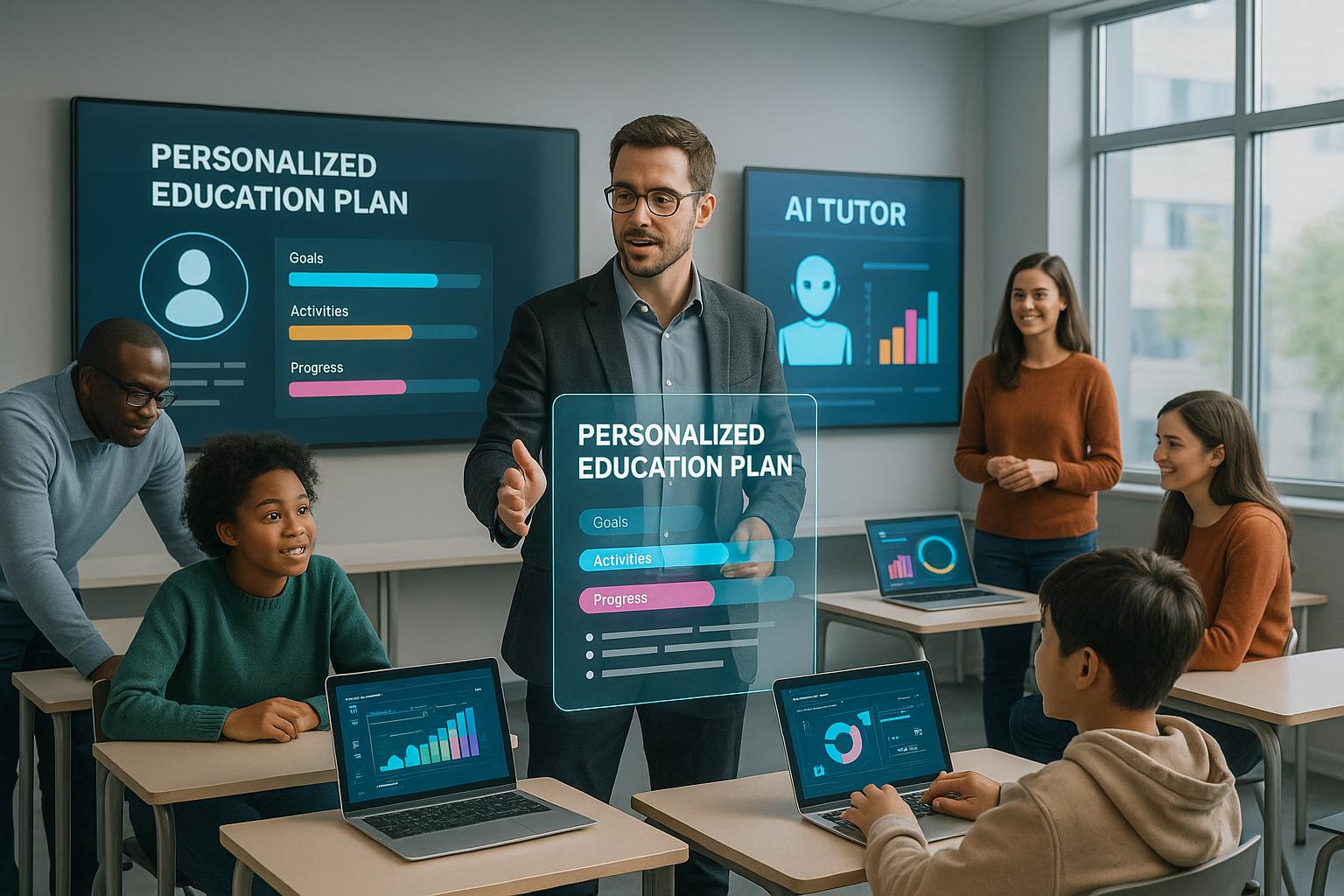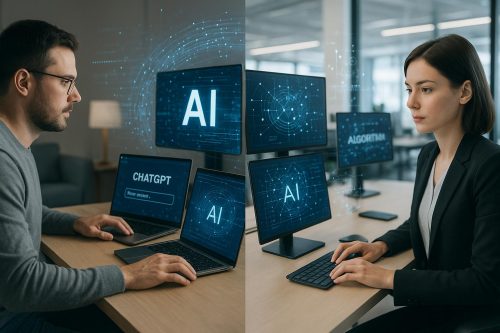Future Education jobs are a big question mark. By 2030, AI, personalized learning, and global demand will redefine careers in education. Here’s what you need to know:
- Emerging Roles: AI tutoring specialists, personalized learning designers, and virtual classroom managers are transforming education.
- Skills Needed: Master AI basics, data analysis, and learning management systems. Combine tech with creativity and problem-solving.
- Market Growth: The global education market will hit $10 trillion by 2030, with e-learning projected at $686.9 billion.
- Challenges: Address AI bias, protect student data, and navigate ethical concerns.
To prepare, focus on certifications, digital tools, and building expertise in AI integration. The education sector is evolving – adapt now to lead the way.
The Impact of AI on Work, and Future Education Jobs: Special Keynote
New Education Career Paths by 2030
The landscape of education is evolving, driven by advancements in AI and digital platforms. These future education jobs blend traditional teaching principles with cutting-edge technology, creating opportunities for professionals skilled in both areas.
Jensen Huang, CEO of Nvidia, shared a compelling glimpse into this transformation, describing his use of an AI personal tutor:
“I have [an AI] personal tutor with me all the time. That AI tutor can just teach you things, anything you like, help you program, help you write, help you analyze, help you think, help you reason”.
This insight highlights how AI and technology are reshaping education, paving the way for specialized roles that will define the future of learning.
AI Tutoring Careers: Digital Education Specialists
One of the most rapidly growing areas in education is AI tutoring specialists. These professionals design intelligent tutoring systems that provide personalized exercises and real-time feedback. Collaborating with educators, they translate learning objectives into adaptive algorithms that cater to individual student needs.
These systems have proven to be highly effective. Independent evaluations show they deliver precise and meaningful support, allowing teachers to focus on more complex topics while the AI handles routine tasks like practice drills and assessments.
AI trainers play a crucial role in refining these systems. By analyzing student interaction data and identifying learning patterns, they fine-tune the AI’s responses to improve educational outcomes. As Huang points out, working with AI requires a combination of technical expertise and a knack for crafting effective prompts:
“Asking AI to be an assistant to you requires some expertise and artistry in how to prompt it”.
This blend of technical skills and educational insight makes AI tutoring a dynamic and promising career path.
Personalized Learning Roles: Custom Education Designers
Personalized learning specialists are redefining how education is delivered by moving away from a one-size-fits-all approach. Instead, they create platforms that adapt to each student’s pace, preferences, and strengths. This shift is significant, as 79% of parents and 73% of teachers express dissatisfaction with traditional, standardized teaching methods.
These specialists design systems that adjust in real-time, offering tailored learning experiences. For instance, schools using personalized math games reported an 11.6% improvement in standardized test scores. Similarly, flipped instruction models, which allow students to learn at their own pace, dramatically reduced English failure rates from over 50% to 19%, and math failure rates from 44% to 13%.
Custom education designers take this a step further by creating “personalized learning playlists.” These playlists are dynamic sequences of activities, resources, and assessments that evolve based on student engagement and performance. Mary Ann Wolf, an expert in this field, explains the role of technology in enabling such approaches:
“Personalized learning requires not only a shift in the design of schooling, but also a leveraging of modern technologies… Personalized learning is enabled by e-learning systems which help dynamically track and manage the learning needs of all students… everywhere at anytime”.
These roles demand a deep understanding of both educational theory and data analytics, ensuring that technology complements, rather than replaces, human instruction.
Virtual Classroom Managers: Online Learning Coordinators
The role of virtual classroom managers has grown from basic tech support to overseeing all aspects of online learning, which impacts future education jobs. These professionals ensure that digital platforms run smoothly, creating an effective and inclusive learning environment for both students and teachers.
The e-learning industry is projected to hit $686.9 billion by 2030, with the virtual classroom segment alone expected to grow to $74.01 billion, at an annual growth rate of 19.41%. This growth underscores the importance of virtual classroom managers, who establish clear structures and expectations for online learning. Platforms like Google Classroom are used to set daily agendas and maintain consistent lesson formats, providing much-needed stability for students and educators alike.
Currently, 67% of teachers report that their training programs haven’t adequately prepared them for online instruction. Virtual classroom managers help bridge this gap by offering the technical and operational support educators need. They also prioritize accessibility, tailoring online instruction to meet the diverse needs of students while coordinating with support staff to keep parents engaged.
The value of this role is evident in student feedback. Among those participating in virtual classrooms, 63% found the format convenient, time-saving, and well-suited to their work-life balance. These managers also oversee automation tools that provide instant feedback and track progress, ensuring technology enhances learning without creating obstacles.
As these roles continue to evolve, they highlight how education careers are transforming. Each requires a unique mix of skills, blending educational expertise with technological fluency, offering exciting opportunities for those ready to embrace the future of learning.
Skills Needed for Future Education Jobs
The education landscape is shifting rapidly, and future roles in the field will require a mix of tech-savviness and teaching expertise. Professionals stepping into edtech jobs 2030 need to balance traditional teaching strategies with the latest technological advancements to thrive in this evolving space. Let’s dive into the essential technical skills and training programs shaping the future of education.
Technical Skills for AI and EdTech Jobs
To excel in edtech roles, understanding the basics of AI – like natural language processing, predictive analytics, and adaptive learning systems – is a must. Another critical skill is data analysis. With the global education technology market projected to grow from $142.37 billion in 2023 to $598.82 billion by 2030, the demand for professionals who can interpret learning analytics and use data to refine educational strategies is skyrocketing.
Educators will also need platform management skills to oversee systems, allocate resources, and make sense of analytics dashboards. For example, managing virtual classrooms requires familiarity with a range of digital tools to create organized and productive online learning environments.
A strong technical foundation also includes using automation tools that handle routine tasks like providing instant feedback and tracking student progress. These tools free up educators to focus on more complex and meaningful teaching tasks.
But technical know-how alone isn’t enough. Analytical thinking and creativity are just as important in innovating education.
Analytical Thinking and Problem-Solving Skills
Beyond technical expertise, educators must sharpen their analytical skills to meet the ever-changing needs of students. Critical thinking and creativity are more valuable than ever, replacing outdated methods like rote memorization. Those working in personalized learning roles need to assess individual student needs and design learning paths that adapt in real time.
Problem-solving skills are crucial for addressing both learning gaps and technical issues. AI tools can identify these gaps and suggest tailored learning plans, but it’s up to educators to turn those insights into actionable strategies.
Modern teaching also calls for the ability to use technology creatively. Educators need to help students demonstrate their knowledge in diverse ways, moving beyond traditional exams. Additionally, having strong pattern recognition skills allows teachers to identify trends in student engagement and performance, enabling them to adjust their approach proactively for better outcomes.
Training Programs for Education Professionals
To prepare for these tech-driven roles, many educators are turning to specialized certification programs. One standout is Google’s “Generative AI for Educators” course, which is free and designed to save time. According to recent data, 83% of educators who completed the course anticipate saving over two hours weekly by using generative AI tools, and 74% feel confident integrating AI into their teaching.
School districts across the country have embraced these opportunities. Michael Matsuda, Superintendent of Anaheim Union High School District, highlighted the program’s value:
“The Google Generative AI for Educators opportunity for teachers will help put our educators on the front lines of generative AI opportunities for our 27,000 students. In a rapidly evolving world, our teachers cannot afford to fall behind in accessing powerful generative tools that will help them develop new approaches to teaching and learning.”
Other certifications cater to both beginners and advanced learners. For instance, DataCamp’s AI Fundamentals Certification costs $25 per month and is ideal for those starting out. Meanwhile, the University of Pennsylvania offers “Introduction to Teaching With Artificial Intelligence”, a more in-depth course priced at $1,500, which also provides continuing education credit.
For educators seeking hands-on experience, programs like EdTechTeacher’s “AI in Education Training” focus on practical applications. Priced at $500, this training equips teachers with skills to automate tasks and enhance course delivery .
The timing for these programs couldn’t be better, as the global e-learning market is expected to hit $1.85 billion by 2030, growing at an annual rate of 25.2%. Reflecting on this transformation, Oklahoma Secretary of Education Nellie Tayloe Sanders shared:
“Google and MIT’s Generative AI for Educators course marks a transformative moment for Oklahoma’s education… This initiative equips educators to unlock each student’s potential, tailoring learning experiences to their unique minds. It’s a step towards a future where education mirrors the individuality of a fingerprint, empowering students to shape tomorrow with their ingenuity.”
These skills and training programs underscore a future where technology and human expertise work hand in hand, paving the way for more personalized and effective learning experiences.
sbb-itb-eb32bf3
Challenges in Future Education Jobs
As technology reshapes the education landscape, professionals stepping into future education roles face challenges that extend far beyond mastering new tools. The rise of AI and digital platforms brings ethical concerns and practical barriers that educators must navigate. Understanding these issues is essential for those preparing for tomorrow’s educational careers.
Addressing Bias in AI Education Systems
AI-driven roles, such as AI tutoring, come with a significant challenge: the risk of algorithmic bias, which can unfairly influence student outcomes. Education experts Ken Shelton and Dee Lanier highlight this issue:
“The bias that exists ‘out there’ is the same bias that exists in ourselves”.
In other words, AI systems often reflect and even magnify the biases already present in society.
AI tools used in education and job screening can unintentionally reinforce these biases, creating unequal opportunities for students. To tackle this, educators must take deliberate steps, starting with involving diverse groups – students, teachers, and community members – early in the development of AI tools. Transparency is key: educators should demand clear information about the datasets used to train AI systems and whether student data was part of the testing process.
Testing these tools with diverse student groups and comparing results across different demographics can help identify potential biases. Continuous monitoring systems are also essential to catch and address discriminatory patterns early on. Building AI systems that prioritize racial equity requires diverse development teams, comprehensive training for educators, and strict regulations to hold technology providers accountable.
While addressing bias is crucial, another pressing issue lies in managing the vast amounts of student data generated by these digital platforms.
Student Data Privacy in EdTech
The surge in digital learning tools has made protecting student data a critical responsibility for those in education jobs of the future. With schools gathering enormous amounts of information, safeguarding this data has become a central concern for educators and administrators.
Statistics reveal the gap between responsibility and preparedness: nearly 90% of EdTech leaders oversee their district’s student data privacy programs, yet 73% admit it’s not officially part of their job descriptions. This lack of clarity leaves many ill-equipped to handle the task. Furthermore, 89% of leaders cite employee-related issues as a major obstacle to ensuring data security.
High-profile breaches, such as the Illuminate Education incident, highlight the risks, including identity theft for students. Professionals in roles like virtual classroom management must adopt comprehensive privacy strategies. Keith Krueger, CEO of CoSN, underscores the urgency:
“The 2025 National Student Data Privacy Report underscores the urgent need for stronger leadership, training and resources to protect student data in an increasingly digital world”.
Practical solutions include creating detailed inventories of all online tools used by a school district and implementing clear policies to evaluate new EdTech tools before adoption. Contracts with vendors should explicitly define how data can and cannot be used, and robust security measures, like multi-factor authentication, must be enforced. Additionally, schools should collect only the data they truly need and ensure privacy policies are communicated clearly to students and families.
Transparency is a cornerstone of trust. Linnette Attai, Project Director of CoSN’s Student Data Privacy Initiative, emphasizes:
“Protecting student data privacy has never been more important. The report demonstrates – for the first time – what school districts really need to be successful in their privacy efforts”.
With 99% of districts prioritizing better cybersecurity measures, achieving success in data privacy will require standardized procedures, central oversight of technology tools, thorough staff training, and strong leadership support. Ultimately, protecting student data isn’t just about technical fixes – it’s about creating a culture where privacy and security are ingrained in every aspect of education.
Preparing for Future Education Careers
Getting ready now is the key to securing top roles in the AI-driven education market of 2030. With the rapid growth of AI and the increasing importance of digital literacy, educators need to take deliberate steps to stay ahead.
The World Economic Forum predicts 170 million new jobs by 2030, highlighting the urgent need for skill upgrades in education. Nearly 39% of current educational skills are expected to undergo changes by then. By taking the right steps today, educators can position themselves for roles in AI tutoring and personalized learning.
Assess Your Digital Skills
Before jumping into advanced certifications, take a moment to evaluate your current digital skills. This includes basic computer literacy, familiarity with online platforms, and your comfort level with adopting new technologies. Identify where you’re falling short and address those gaps with targeted online courses. For example, DataCamp offers an AI Fundamentals Certification for $25 per month, while NVIDIA provides free Jetson AI Certifications.
Master Learning Management Systems
To thrive as a virtual classroom manager or personalized learning specialist, you’ll need to master Learning Management Systems (LMS). Platforms like Canvas, Blackboard, and Moodle are essential tools. Explore free trials and tutorials to build your proficiency. Considering the online learning market is expected to hit $279.30 billion by 2029, these skills will only grow in demand.
Dr. Gary Wood from Sheffield Engineering Leadership Academy emphasizes the shifting educational landscape:
“There will be an increasing focus on supporting students into the professional environment. Degree apprenticeships and alternative models of higher education will continue to grow”.
Once you’re comfortable with LMS platforms, take the next step by integrating AI tools to enhance personalized learning.
Develop AI Integration Skills
AI is already reshaping classrooms, with 60% of educators using it daily. Start small – experiment with AI tutoring platforms for specific subjects, then gradually expand your use of these tools. Becoming proficient in AI technologies now will prepare you for a future where they are central to teaching.
Build Professional Networks and Lifelong Learning Habits
Transitioning into future education roles isn’t just about technical know-how – it’s also about building strong connections. Join online educator communities, attend webinars, and participate in EdTech conferences to stay updated on trends and opportunities.
Annie Chechitelli, Chief Product Officer at Turnitin, highlights the evolving role of technology in education:
“For 2025, I think a major shift we will continue to see will be around how educators view and apply the technology in the classroom – from AI skepticism to identifying responsible and ethical uses. AI writing is here to stay, and competency of the technology will be required of students in their future professions”.
Embrace lifelong learning through short courses, microcredentials, and modular degrees. Focus on skills that emphasize decision-making and learner-centered approaches over compliance-driven teaching. Pairing certifications with a strong professional network ensures ongoing growth.
Pursue Relevant Certifications
Strategic certifications can give you an edge in emerging education roles. Here are some options to consider:
- For AI Tutoring Careers: Microsoft Certified Azure AI Engineer Associate or Stanford’s AI Graduate Certificate.
- For Virtual Classroom Management: Certified Virtual Classroom Facilitator (CVC) or Auburn University‘s Teaching With AI course ($89).
- For EdTech Jobs in 2030: Georgia Tech‘s ChatGPT for Educators Professional Certificate ($297) bridges traditional teaching with technology.
Create Engaging Digital Content
To stand out, educators need to excel at creating multimedia content. Tools like Camtasia, Canva, and Kahoot! are great for producing engaging materials. Build a portfolio showcasing your digital content skills, and establish an online presence through a professional website or social media profiles. These platforms can highlight your teaching experience, digital expertise, and certifications to potential employers.
Focus on Human-AI Collaboration
As AI becomes more integrated into education, blending technical skills with human insight will be critical. Emotional intelligence, adaptability, and cognitive skills will complement AI capabilities, allowing educators to provide personalized support alongside AI tutoring.
The shift is already happening. In 2024, 26% of American teenagers used ChatGPT for studying – double the rate from the previous year. Educators who prepare now will be ready to lead in this evolving landscape, rather than scrambling to keep up.
FAQs
How can educators tackle AI bias and promote fairness in future education jobs?
To address AI bias and encourage fairness in the education sector, educators can take a few key steps. Conducting regular audits of AI tools is crucial to spotting and correcting any biases, ensuring these technologies support all students fairly and effectively. Alongside this, establishing ethical guidelines for AI use in classrooms can help make inclusivity a priority.
It’s also important to focus on equal access to AI resources so that every student can benefit from these tools, regardless of their background. Training teachers to understand both the capabilities and limitations of AI is another essential step. This equips educators to make well-informed decisions about how AI is used in their classrooms. By promoting awareness and accountability, educators can harness AI to improve learning experiences while keeping bias in check.
How can teachers get ready to use AI and personalized learning systems in their classrooms?
To get ready for bringing AI and personalized learning systems into classrooms, teachers can take a few practical steps:
- Get to know the tools: Spend time exploring AI-powered platforms designed to assist with tasks like lesson planning, grading, and giving personalized feedback. The better you understand these tools, the more effectively you can use them to meet your students’ unique needs.
- Focus on professional growth: Attend workshops or training sessions that dive into AI in education. These opportunities can offer hands-on practice and help you navigate important ethical considerations.
- Work with colleagues: Connect with other educators to share ideas and strategies. Collaborating can uncover creative and effective ways to bring AI into your teaching.
By staying informed and open to new approaches, teachers can create learning environments that are more engaging and tailored to each student’s needs.
How can schools protect student data privacy in today’s digital learning environment?
To protect student data privacy in today’s digital education environment, schools need to prioritize a few key strategies. First, compliance with laws like the Family Educational Rights and Privacy Act (FERPA) is essential. These regulations outline how student records should be handled and safeguarded. Conducting regular audits of data practices can also help pinpoint vulnerabilities and address them proactively.
Strong security measures are another must. Using encryption and secure access controls can significantly reduce the risk of unauthorized access to sensitive information. Equally important is training educators and administrators on privacy best practices. This not only strengthens security efforts but also fosters a sense of responsibility across the board.
Transparency is crucial, too. Schools should openly communicate with parents and students about how their data is collected, used, and protected. Clear communication builds trust and ensures that everyone involved understands their role in keeping student information safe.





